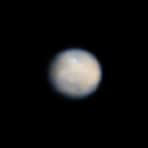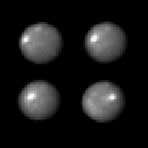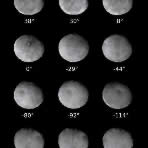Quick Nav
 Ceres
Ceres
Ceres is the largest body in the asteroid belt. For half of the 19th century it was considered to be the 8th planet and in 2006 it was promoted to a Dwarf Planet.
| Distance from Sun: | |
|---|---|
| Mean: | 2.77 AU |
| Perihelion: | 446,669,322 km |
| Ahelion: | 380,995,855 km |
| Size: | |
| Volume: | 9.29 x 105 km3 |
| Diameter: | 471 km |
| Mass: | 9.43 x 1020 kg |
| Motion: | |
| Year: | 4.6 E Years |
| Day: | 9.07 E Hours |
| Other: | |
| Density: | 207.7 kg per m3 |
| Surface Temperature: | -106°C or 167°K |
Ceres was discovered by Giuseppe Piazzi in January 1801. When he reported it to other astronomers it was too close to the sun for them to confirm his claim. Luckily they didn't disregard his claim and confirmed the discovery later that year. At the time there was a theory that there should be a planet between Mars and Jupiter and many astronomers thought this was it. Thus it was assigned a planetary symbol (top of page) and classified a planet for about 50 years until enough asteroids were discovered to cause it to be reclassified as an asteroid.
In 2006, following the addtion of the Dwarf Planet Classification, Ceres was reclassified as a Dwarf Planet with Pluto and other planet-like bodies in our solar system.
Ceres Gallery
 Hubble - Ceres 1
Hubble - Ceres 1 Hubble - Ceres 2
Hubble - Ceres 2 Keck - Ceres Rotation
Keck - Ceres Rotation